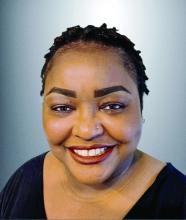Shedding the super doctor myth

It’s been more than a year since we came face to face with an unprecedented, unrelenting pandemic. Determined to overcome, determined to forge ahead, we worked tirelessly.
Hours upon hours, days upon days, months upon months. Hoping for recovery while facing the devastation of death. We were praised, and lauded as heroes as we pleaded for essential protective gear and urged our communities to think critically, act responsibly, and distance safely. From the cities to small towns, we answered the call. Leaving long-practiced specialties, reassigned from our practices and training, we worked together uncertain of the future, but committed to safeguarding our present. Through sacrifice we toiled, leaving our families to protect against contagion, wading through halls of the sick and fighting against the threat of death.
As days swept into months, the impact of isolation and economic deceleration yielded cracks on the surface. Pay cuts loomed, furloughs abounded, and distance-learning infiltrated the medical community. Yet, COVID-19 reigned, and with it came frustration, exhaustion, and emotional defeat. Despite racial reckonings, political turmoil, and massive protests, we worked tirelessly. We persevered.
Throughout 2020, the praise of “Health Care Heroes” rang out around the world. We saw images of medical professionals diligently working through the unthinkable with grace and humility, truly sacrificing for the greater good without complaint. Day after day, hour after hour, month after month. All the while, cracks were surfacing, expanding wider, and penetrating deeper. We were weary.
During a recent appointment with my primary care physician, she looked at me, her eyes brimming with earnest compassion, and said, “If you have suicidal thoughts, please let me know. That is my biggest worry with doctors.” I knowingly looked at her, keen in understanding as I recalled the stories. Doctors overwhelmed and uncertain, released by the abrupt completion of suicide.
Although broader government agencies may regulate and enforce, it is up to us to facilitate and comply. The pressure is immense, but our calling is strong – an unspoken agreement that begins with an oath.
As a psychiatrist, I am acutely aware of the warning signs associated with suicidality. Reading through the stories of loss and seeing the bewilderment and despair of the bereft, I once again wonder whether the pressure of medicine is worth the cost. How can we be “Health Care Heroes” if we fail to recognize the fragility that resides within ourselves? Moreover, how do we see beyond the illusion of invulnerability and accept that vulnerability is not a sign of weakness but a hallmark of strength and empathy? These are some of the issues I will be exploring in this new column, Myth of the Super Doctor.
Beginning at the beginning
Addressing these issues starts with training. As a new cohort of eager students enters medical/osteopathic school, the focus should lie not only on foundations of medicine and brute memorization of copious information but also on self-care, wellness checks, and group morale. The same emphasis placed upon patient care and advocacy must also be extended toward ensuring that the next generation of physicians will understand the importance of caring for themselves as much as they care for others.
In the same manner, past stereotypes of ruthless, cut-throat, competition must also evolve. Although the spirit of hard work and perseverance is essential, the manner it propagates is just as important. Aggressive questioning, myriad testing, rigid hierarchies, blind obedience, and ego inflation may separate the pack, but it also reinforces individualism and isolation. Students may shield their internal turmoil behind a mask. The mask of the Super Doctor.
However, as the pandemic has shown, even the most durable of masks will eventually fail. So how do we recognize and accept that help is needed? How do we access support? First, it is vital to acknowledge that there is no shame in asking for help. It is both surprising and reassuring that many of us have been there, an unspoken band of brothers and sisters. Second, remember the acronym for depressive symptoms SIGECAPS (sleep, interest, guilt, energy, concentration, appetite, psychomotor, suicide). Remember that these symptoms may develop gradually or feel sudden and overwhelming. Know that mood lability, tearfulness, and isolation may also be present but confused and disregarded as normal consequences of school, residency, or life as a physician. Third, recognize common behavioral changes associated with anxiety, such as irritability, avoidance, and physical symptoms, including headache, muscle aches, joint pain, GI discomfort, palpitations, and insomnia. Last, reach out to colleagues who have suddenly or gradually withdrawn. Schedule frequent check-ins for one another and do not be afraid to admit that you are human. There is no shame in vulnerability but there is bravery and strength.
If you are in school or residency training, reach out to health centers, training directors, supervisors, family and/or friends. Whether you are an early career physician or amid a decades-long career, connect with your peers, reach out to junior members, offer and accept support. Anonymous hotlines, listservs, email groups, virtual meetings, texts, and phone calls also provide opportunities for wellness checks, pep talks, or venting sessions. All are important. In the case where more specialized help is needed, contact your primary care physician, reach out to colleagues in mental health, contact the Suicide Prevention Lifeline at 1-800 273-8255. Know there is help; you are not alone.
In these unprecedented and uncertain times, remember the African proverb “It takes a village.” To ask for help reveals strength and fortitude. The more we advocate for ourselves and one another, the more we will prevail and shed the myth of infallibility.
Dr. Thomas is a board-certified adult psychiatrist with an interest in chronic illness, women’s behavioral health, and minority mental health. She currently practices in North Kingstown and East Providence, R.I. She has no conflicts of interest.






